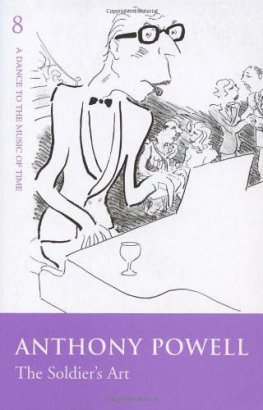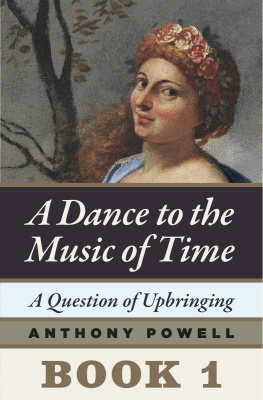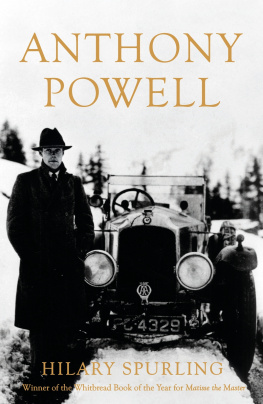Anthony Powell - Temporary Kings
Here you can read online Anthony Powell - Temporary Kings full text of the book (entire story) in english for free. Download pdf and epub, get meaning, cover and reviews about this ebook. genre: Prose. Description of the work, (preface) as well as reviews are available. Best literature library LitArk.com created for fans of good reading and offers a wide selection of genres:
Romance novel
Science fiction
Adventure
Detective
Science
History
Home and family
Prose
Art
Politics
Computer
Non-fiction
Religion
Business
Children
Humor
Choose a favorite category and find really read worthwhile books. Enjoy immersion in the world of imagination, feel the emotions of the characters or learn something new for yourself, make an fascinating discovery.

- Book:
- Author:
- Genre:
- Rating:4 / 5
- Favourites:Add to favourites
- Your mark:
- 80
- 1
- 2
- 3
- 4
- 5
: summary, description and annotation
We offer to read an annotation, description, summary or preface (depends on what the author of the book "" wrote himself). If you haven't found the necessary information about the book — write in the comments, we will try to find it.
— read online for free the complete book (whole text) full work
Below is the text of the book, divided by pages. System saving the place of the last page read, allows you to conveniently read the book "" online for free, without having to search again every time where you left off. Put a bookmark, and you can go to the page where you finished reading at any time.
Font size:
Interval:
Bookmark:
Anthony Powell
Temporary Kings
1
The smell of Venice suffused the night, lacustrine essences richly distilled. Late summer was hot here. A very old man took the floor. Hoarse, tottering, a few residual teeth, arbitrarily assembled and darkly stained, underpinning the buoyancy of his grin, he rendered the song in slower time than ordinary, clawing the air with his hands, stamping the floor with his feet, while he mimed the action of the cable, straining, creaking, climbing, as it hauled upward towards the volcanic crater the capsule encasing himself and his girl, a journey calculated to stir her ungrateful heart.
Iamme, iamme, via montiam su l .
Iamme, iamme, via montiam su l .
Funicul funicul , via montiam su l .
A first initiatory visit to Italy, travelling as a boy with my parents, had included a week at this same hotel. It overlooked the Grand Canal. Then small, rather poky even, its waterfront now extended on either side of the terrace, where, by tradition, the musicians gondola tied up. Near-tourist outfits replaced evening dress antique as the troupe itself, in other respects the pattern remained unaltered, notably this veteran and the business of his song. Could he be the same man? A mere forty years indeed three or four short of that might well have passed without much perceptible transmutation in a faade already radically weathered by Time when first observed. The gestures were identical. With an operatic out-thrust of the body, he intimated the kingdoms of the earth ranged beneath funicular passengers for their delectation.
Si vede Francia, Procida, la Spagna,
E io veggo te, io veggo te.
The century all but within his grasp, the singer might actually recollect the occasion for which the song had been composed; on that great day, as the words postulated, himself ascended Vesuvius accompanied by his inamorata, snug together in the newly installed spaceship, auspicious with potentialities for seduction. Had a dominating personality, the suggestive rotations of the machinery, Procidas isle laid out far below, like a girl spreadeagled on her back, all combined to do the trick? The answer was surely affirmative. Even if marriage remained in question conceivably the librettists deference to convention at least warmer contacts must have been attained.
The stylized movements of the hands were reminiscent of Dicky, Umfraville at one of his impersonations. He too should have harnessed his gift, in early life, to an ever renewing art from which there was no retiring age. To exhibit themselves, perform before a crowd, is the keenest pleasure many people know, yet self-presentation without a basis in art is liable to crumble into dust and ashes. Professional commitment to his own representations might have kept at bay the melancholy all but chronic, Frederica and his stepchildren complained now that Umfraville had retired from work as agent at Thrubworth. Sometimes, after a days racing, for example, he might return to the old accustomed form. Even then a few misplaced bets would bring the conviction that luck was gone for good, his life over.
Christ, what a shambles. Feeling my back too. Trumpeter, what are you sounding now? Defaulters, old boy, if your names Jerry Hat-Trick. You know growing olds like being increasingly penalized for a crime you havent committed.
Which ones havent you committed? said Frederica. Youve never grown up, darling. You cant grow old till youve done that.
Sufferance, as well as affection, was implied, though Frederica had never tired of Umfraville, in spite of being often cross with him.
I feel like the man in the ghost story, scrambling over the breakwaters with the Horrible Thing behind him getting closer and closer. There hasnt been a good laugh since that horse-box backed over Buster Foxe at Lingfield.
As a rule Umfraville disliked mention of death, but the legend of Buster Foxes immolation under the wheels of a kind of Houyhnhnm juggernaut, travelling in reverse gear, was the exception. It had resolutely passed into Umfraville myth. Captain Foxes end (he had been promoted during the war) was less dramatic, though certainly brought about by some fatal accident near the course, terminating for ever risk of seeing an old enemy at future race-meetings. It would be worth asking Umfraville if he had his own version of Funicul-Funicul , an accomplishment by no means out of the question.
The present vocalist to some extent controverted Fredericas argument, supporting more St John Clarkes observation that growing old consists abundantly of growing young. The aged singer looked as if thoughts of death, melancholy in any form, were unknown to him. He could be conceived as suffering from rage, desire, misery, anguish, despair; not melancholy. That was clear; additionally so after the round of applause following his number. The clapping was reasonably hearty considering the heat, almost as oppressive as throughout the day just passed. Dr Emily Brightman and I joined in. Acknowledgment of his talent delighted the performer. He bowed again and again, repeatedly baring blackened sporadic stumps, while he mopped away streams of sweat that coursed down channels of dry loose skin ridging either side of his mouth. Longevity had brought not the smallest sense of repletion where public recognition was in question. That was on the whole sympathetic. One found oneself taking more interest than formerly in the habits and lineaments of old age.
In spite of the singers own nonchalance, the susceptive tunes of the musicians, the gorgeous dropscene, the second carafe of wine, infected the mind not disagreeably with thoughts of the evanescence of things. At the beginning of the century, Marinetti and the Futurists had wanted to make a fresh start whatever that might mean advocating, among other projects, filling up the Venetian canals with the rubble of the Venetian palaces. Now, the Futurists, with their sentimentality about the future, primitive machinery, vintage motor-cars, seemed as antiquely picturesque as the Doge in the Bucentaur, wedding his bride the Sea, almost as distant in time; though true that a desire to destroy, a hatred and fear of the past, remained a constant in human behaviour.
Do you think the soubrette is his mistress, or his great-granddaughter? asked Dr Brightman. They seem on very close terms. Perhaps both.
From our first meeting, at the opening session of the Conference (when friendly contacts had been achieved by mutual familiarity with Borage and Hellebore, my book about Burton, and her own more famous work on The Triads), Dr Brightman had made clear a determination to repudiate the faintest suspicion of spinsterish prudery that might, very mistakenly, be supposed to attach to her circumstances. Discreetly fashionable clothes emphasized this total severance from anything to be thought of as academic stuffiness, a manner of dress quietly but insistently smart. One of her pupils at the university (our niece Caroline Lovells best friend) alleged a reputation of severity as a tutor, effortless ability to reduce to tears, if necessary, the most bumptious female student. Dr Brightman, it was true, was undoubtedly a little formidable at first impact. We touched on the Dark Ages. She spoke of her present engagement on Boethius, in a form likely to prove controversial. The male don of her name, known to me when myself an undergraduate, appeared to be only a distant relation.
You mean Harold Brightman, who played some part in organizing a dinner to celebrate the ninetieth birthday of that old rascal Sillery? Hes a cousin of some sort. There are scores of them engaged in the learned professions. We all stem from the Revd Salathiel Brightman, named in The Dunciad in connexion with some long forgotten squabble about a piece of Augustan pedantry. He composed
Font size:
Interval:
Bookmark:
Similar books «»
Look at similar books to . We have selected literature similar in name and meaning in the hope of providing readers with more options to find new, interesting, not yet read works.
Discussion, reviews of the book and just readers' own opinions. Leave your comments, write what you think about the work, its meaning or the main characters. Specify what exactly you liked and what you didn't like, and why you think so.






